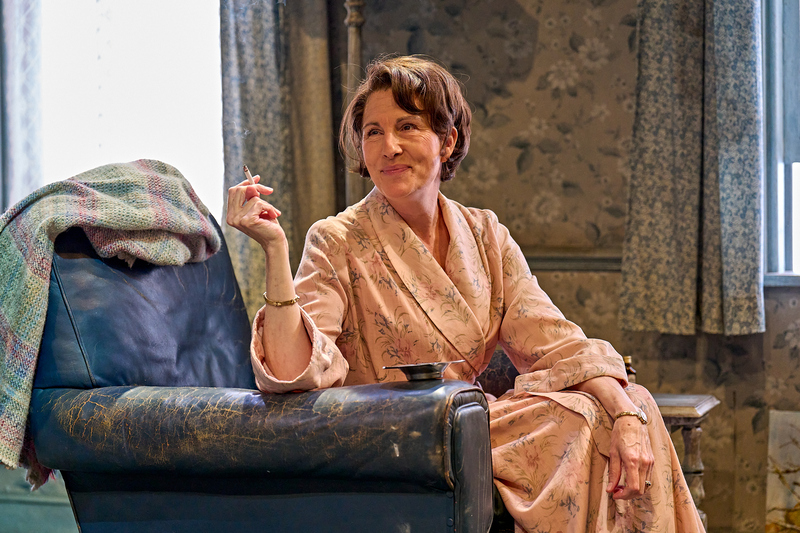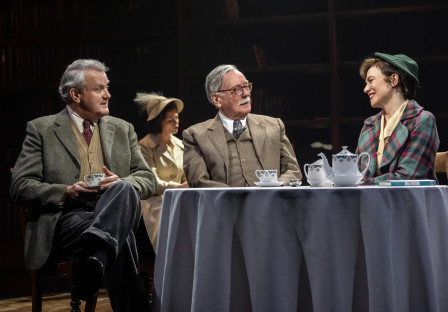Review: THE DEEP BLUE SEA at Theatre Royal Haymarket
Lindsey Posner’s revival of Terence Rattigan’s 1911 classic, The Deep Blue Sea, is a bleak exploration of obsession and despair in the aftermath of an affair. The story drags on ever so slightly, but a talented cast and clever direction make it a compelling, thought-provoking watch.
 Tamsin Greig in THE DEEP BLUE SEA at Theatre Royal Haymarket
Tamsin Greig in THE DEEP BLUE SEA at Theatre Royal Haymarket
The Deep Blue Sea opens with the neighbours of Hester Coulier discovering her in her West London flat after an attempted suicide. In the last ten months, Hester has left her husband, the wealthy and distinguished Sir William Collyer, for the alcoholic RAF pilot Freddie Page, who no longer seems to love her.
Immediately, the set design captures the play’s melancholy tone. Hester and Freddie’s flat is tiny and dismal, but beautifully detailed in its dismalness, with peeling wallpaper and faded furniture, and Hester’s paintings being the only notable spots of bright colour in the space. The play also takes place entirely in the confines of the flat, evoking a sickly sense of claustrophobia - the same feeling of being trapped that Hester no doubt experiences.
Tamsin Greig plays Hester with all the nuance and complexity afforded to a character whom we are meant to feel frustrated but also pitying towards. But she also peppers her performance with moments of dry, sardonic humour, and there’s a marked difference in her body language when she is alone versus when she’s among company, as if she’s constantly putting on a mask. The restrained subtlety of her performance makes her explosions of emotions - shrieking on the phone to Freddie, or when her laughter dissolves into hysterical sobs that are cut off abruptly - all the more jarring.
While the relationship between her and the infuriatingly and comically self-centred Freddie takes centre-stage, it’s in her interactions with her ex-husband that Greig truly shines - the chemistry between her and Nicholas Farrell, who plays Sir William with a kind of dignified stoicism that threatens to crack as the play goes on, is electric every time they share a scene. But it’s Finbar Lynch’s Mr (not Dr, as he likes to remind us) Miller who really steals the show. He is Hester’s crotetchy but kind-hearted neighbour, an ex-doctor barred from practicing for unknown reasons, who doles out witticisms and words of wisdom in the same flat, sardonic tone.
The humour is a saving grace, because the play as a whole verges on depressing to an almost absurd degree. The story is constantly weighed down by the endless circular arguments between Hester and Freddie, and characters storming out and bursting into the claustrophobic flat. The play spends a lot of time referencing past events - Hester and Sir William’s failing marriage, and Hester and Freddie’s subsequent affair - that feel more interesting than the present-day events, which seem more like an epilogue to a different play that we missed out on.
By the end of it, I was fidgeting slightly in my seat, wondering when it would be over - but perhaps this was the point, a way to emulate and have us experience Hester’s own endless despair, her boredom with the monotony of her new life, and her feeling of being trapped in a prison of her own choices. As she notes, ‘When you’re stuck between the devil and the deep blue sea, the deep blue sea can sometimes look very inviting'.
Terence Rattigan based this play somewhat on his own secret relationship with another man, and one can see how his own personal feelings of bitterness and frustration seeped into the cutting dialogue and morbid, often unlikeable characters. Posner's production captures the mood of the play with perfect accuracy, while highlighting the moments of levity and humanity that keep it from weighing too heavily on its audience. While an overall sombre play, The Deep Blue Sea will stay with you long after you've left the theatre.
Latest News

 Review: SHADOWLANDS at Aldwych Theatre
14 February 2026 at 18:17
Review: SHADOWLANDS at Aldwych Theatre
14 February 2026 at 18:17

 Review: I'M SORRY, PRIME MINISTER at Apollo Theatre
13 February 2026 at 14:55
Review: I'M SORRY, PRIME MINISTER at Apollo Theatre
13 February 2026 at 14:55

 Review: THE UNLIKELY PILGRIMAGE OF HAROLD FRY at Theatre Royal Haymarket
13 February 2026 at 13:18
Review: THE UNLIKELY PILGRIMAGE OF HAROLD FRY at Theatre Royal Haymarket
13 February 2026 at 13:18

 Review Round-Up: I'M SORRY PRIME MINISTER at the Apollo Theatre
13 February 2026 at 12:54
Review Round-Up: I'M SORRY PRIME MINISTER at the Apollo Theatre
13 February 2026 at 12:54